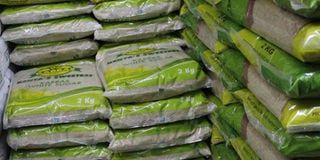Why ‘unattractive’ brown sugar is better than white

Sugar in a supermarket in Nairobi. Local manufacturers usually have to make the choice of making brown or white sugar. PHOTO | FILE | NATION MEDIA GROUP
What you need to know:
All sugars manufactured within the parameters of statutory standards are safe for human consumption.
If you are wary about your health though, you need to make a more conscious choice between brown and white sugar.
- White sugar is normally more expensive than brown sugar — as it is meant for a certain economic class — because of the cost of making it.
Since we love class and opulence, we go for the most expensive products.
With increased disposable income, the middle class, who have gladly embraced consumerism in a bid to make up for what they had missed, is busy putting poison into their bodies for lack of information. We even feed our children burnt sausages to show our ‘love’.
The kind of food that we eat changes significantly in tandem with our economic status. We also eat more and do less since we become too busy to exercise. Most potbellies you see around are nursed by rich men and women pumping unnecessary foodstuff into their system.
LOCAL MILLERS
So, when I recently saw a newspaper article in which the writer lamented that one has to put several spoonfuls of white imported sugar into a cup of tea instead of one, I knew that many Kenyans may not know what to look for when choosing between white and brown sugar. What makes one type sweeter than the other?
The sugar in the market is either white or brown but the white one is largely deemed by consumers to be of better quality. Far from it. Consumers also associate most unfamiliar white sugar brands with foreign origins while, indeed, some of them are from local millers.
Local manufacturers usually have to make the choice of making brown or white sugar. But the brown sugar that you ignore on the shelves is much sweeter and healthier than your preferred white one — though it also has its purpose.
NUTRITION
All sugars manufactured within the parameters of statutory standards are safe for human consumption. If you are wary about your health though, you need to make a more conscious choice between brown and white sugar.
Sugarcane, the raw material from which sugar is made, is naturally sweet. The processing of cane to make sugar is a simple process that involves evaporation of the juice to form granules. Glucose and fructose are components in sugarcane that make it sweet. So, in terms of nutrition, brown sugar has more nutrients than white sugar because most of the sweetness components are not removed. Brown sugar is, hence, sweeter.
SWEETER ELEMENTS
White sugar, on the other hand, is more refined to remain with only the sugar. The refining removes the sweeter natural elements, thus making it less sweet. To make white sugar even more appealing to the eye, some companies add a clarifier — a bleaching component that makes it even whiter. That also introduces non-harmful chemicals into the sugar to keep it white.
White sugar is normally more expensive than brown sugar — as it is meant for a certain economic class — because of the cost of making it. It also contains more sugar than brown sugar.
It is you who is pushing the manufactures to make white sugar because you like class.
Of course, the more sugar you put in your tea, the more you deplete the quantity you bought; hence, more sales and profit for the manufacturer. And that tea is no sweeter than if you had used brown sugar; neither does it necessarily mean that you are consuming less sugar. You are simply consuming sugar whose sweetness elements have been removed as impurities!
MORE SPOONFULS
White sugar, and more refined sugar, is usually meant for industrial use — such us making energy and soft drinks.
While Kenyan firms make sugar from sugarcane, countries such as the United Kingdom and Brazil, which, of course, also export theirs, produce it from potato-like plants called sugar beet. Their sugar is ordinarily whiter than ours.
Kenya produces 600,000 tonnes of sugar yearly against a demand of 800,000 tonnes. Until the quantity of imported sugar — mostly white — is reduced or the majority opt for brown sugar, many Kenyans will continue to put more spoonfuls in our tea in pursuit of that elusive, delusive taste.
Mr Awino, a member of Public Relations Society of Kenya (PRSK), is a sugar expert based in western Kenya. [email protected]




